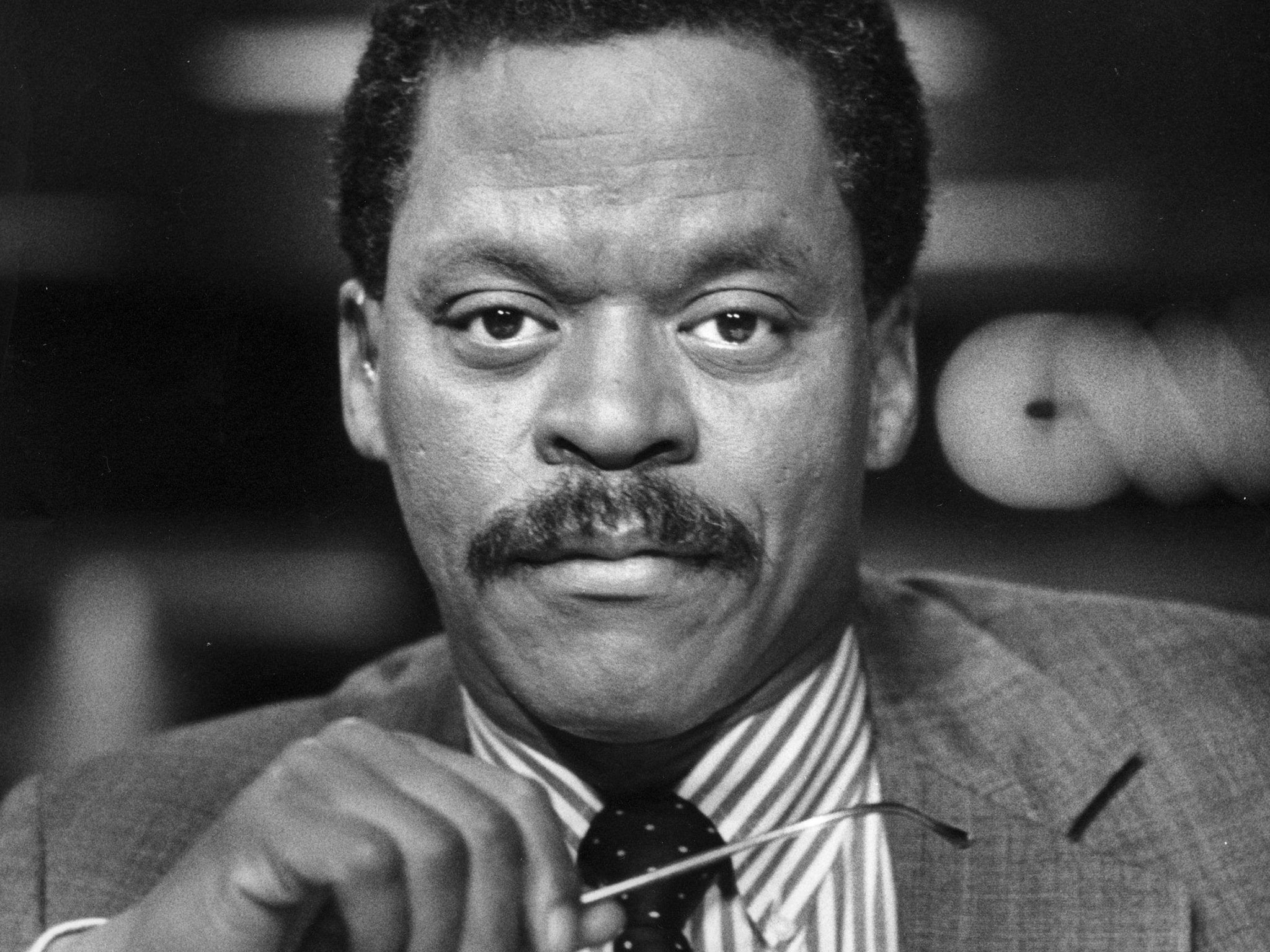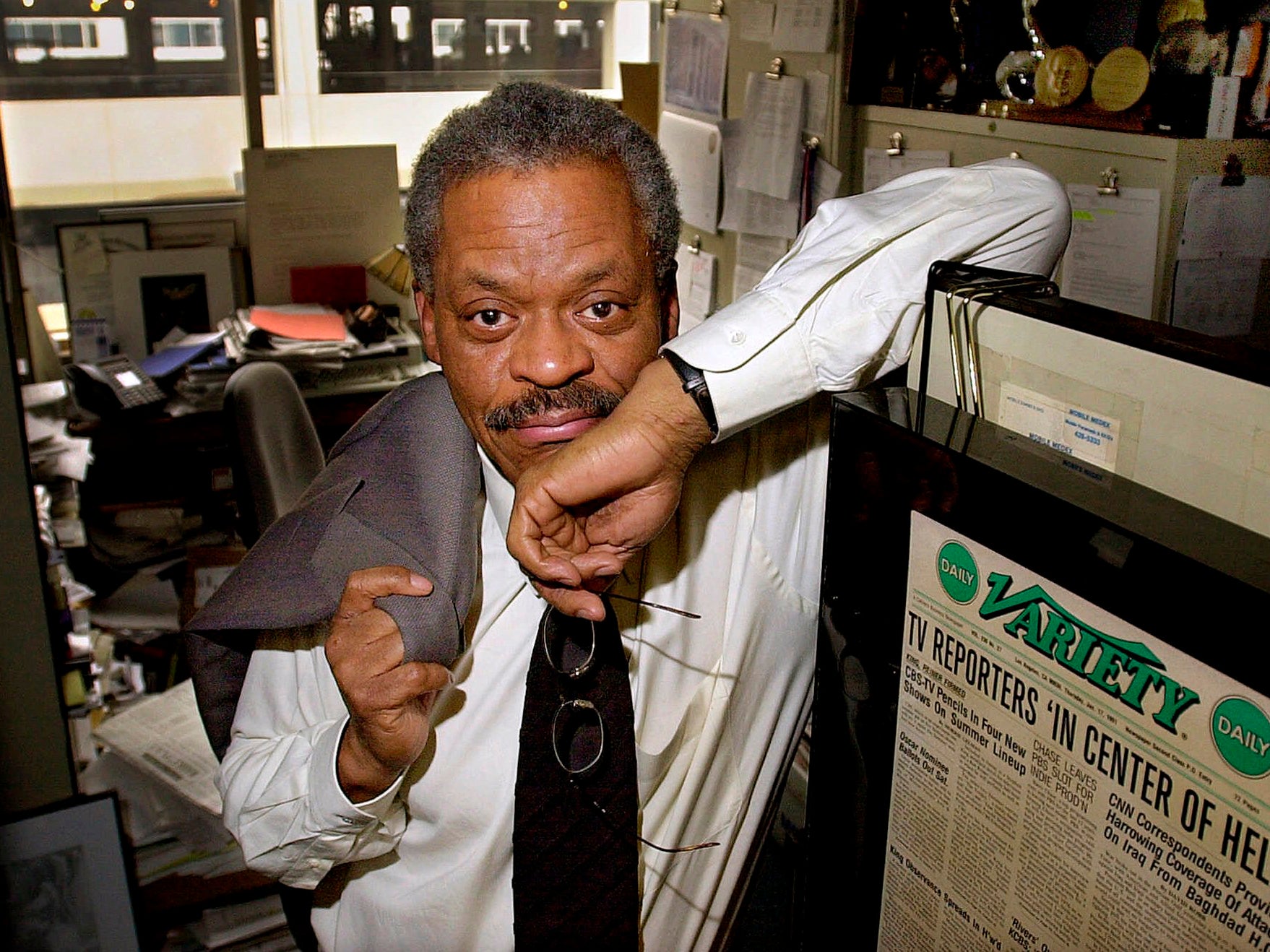Bernard Shaw: Unflappable journalist and CNN’s first chief news anchor
A stalwart on the 24-hour news network, the former US marine helped elevate CNN to global prominence with his riveting coverage from Baghdad during the 1991 Gulf War

Bernard Shaw, a journalist who left network TV in 1980 for the uncertainty of anchoring at the first 24-hour cable news network – CNN – and whose steady-under-missile-fire coverage from Baghdad during the Persian Gulf War helped elevate the outlet to global prominence, has died of pneumonia aged 82.
With his unflappable demeanour and sombre intonation – his heroes were broadcasters Edward R Murrow and Walter Cronkite – Shaw was credited with bringing professional polish to an experiment initially laughed off as the “Chicken Noodle Network” for challenging the Big Three networks for news dominance.
A one-time US marine who got his professional start in Chicago news radio, he joined CNN after covering Washington for CBS and reporting for ABC from Latin America, where he was one of the first journalists on the ground following the 1978 Jonestown massacre in Guyana.
Restless for an anchor job, Shaw took his chances at CNN. Atlanta business and sports mogul Ted Turner, the network’s founder, had gambled on round-the-clock coverage of global events at a time when the major networks offered half-hour evening newscasts and audience appetite for constant news updates was untested.
The job seemed risky at best when Shaw took a salary cut to sign on as a Washington-based anchor. But over the next 21 years, he became vital to CNN’s credibility and the reputation it cultivated for breaking news. He was also one of the most prominent Black journalists on TV before relinquishing the anchor seat in 2001. (In 1978, ABC named Max Robinson the first African American as co-anchor of a major network news broadcast.)
Shaw’s tenure was not without controversy. As moderator of a 1988 presidential debate, he provocatively asked Democratic candidate Michael S Dukakis, the Massachusetts governor, if he would favour capital punishment for the killer if his wife, Kitty Dukakis, were raped and murdered.
Dukakis’s dispassionate response to the hypothetical – flatly restating his opposition to the death penalty – was said to have been a factor in his defeat to his Republican rival, Vice-President George HW Bush.
Shaw acknowledged that some viewers and even fellow journalists thought the question “ghoulish and tasteless”. Dukakis called it “inappropriate” and “outrageous”. But he was unruffled, insisting politicians deserved tough questions.
“I realise that in asking that kind of question, that it would arouse emotions, but I meant the question to Dukakis to be a stethoscope to find out what he was feeling on this issue,” he told The Washington Post at the time. “Bush had been beating Dukakis severely about the head and shoulders, charging he was soft on crime. Many voters perceive seeing and hearing Dukakis but not feeling him. I asked that question to see if there was feeling.”
In 1989, Shaw was among the few American anchormen in Beijing when the Chinese authorities cracked down on pro-democracy student protests at Tiananmen Square. “Goodbye from Beijing,” he said, signing off as the government cut live transmissions and he was forced to phone in further reports.
The most serious test of his skill and stamina came in January 1991, when he arrived in Baghdad hoping for an interview with Iraqi leader Saddam Hussein, whose forces had invaded Kuwait. The interview fell through, and Shaw was making arrangements to leave the country when he found himself stranded, along with colleagues Peter Arnett and John Holliman, as the first US-led coalition bombs fell on the capital on 16 January.
Shaw perched by the window in a ninth-floor room at the Al-Rashid Hotel in Baghdad to witness the blaze of anti-aircraft fire as the Gulf War erupted. Phone lines for the three major broadcast networks were down, leaving the CNN news anchors the only American journalists able to provide live reports via satellite phones.
“The skies over Baghdad have been illuminated,” Shaw told a worldwide cable audience of a billion people. “We’re seeing bright flashes going off all over the sky.”

For the next 16 hours, until the Iraqi authorities shut down their communication, the trio reported non-stop during the onslaught of bombs and cruise missiles, with only brief breaks for sleep. “I’ve never been there,” Shaw told viewers, “but it feels like being in the centre of hell.”
The network received a Peabody Award for distinguished coverage of the war.
“He literally helped put CNN on the map by being on the scene in the Gulf War,” said PBS’s NewsHour anchor Judy Woodruff, a former colleague of Shaw’s at CNN, where they co-hosted the show Inside Politics.
Shaw continued to hopscotch across the US and the globe. In 1995, he spent more than two weeks in Oklahoma City after a domestic terrorist targeted the Alfred P Murrah Federal Building with a truck bomb that killed 168 people. He later described a sense of “post-traumatic stress” from covering such gruesome events.
“That happened to me on a couple of other stories,” Shaw told CNN talk-show host Larry King. “Most of us, we’re so macho, we walk around pretending that these are not factors. But let’s be realistic: it’s really heavy-duty.
“I mean, to stand there yards away from this vertical tomb, to see the concrete-mangled floors,” he continued, “and to know that human beings on each floor of the federal Murrah office building cascaded downward into a permanent hell of death – that has to affect you.”
Bernard Shaw was born in Chicago on 22 May 1940. His appetite for journalism was whetted by his father, a railroad worker and house painter who brought home four newspapers every night. His mother was a housekeeper.
As a teenager, Shaw avidly watched television programs featuring Murrow and Cronkite and set his sights on a broadcast news career. He was undaunted by the lack of Black faces on these broadcasts, later saying he didn’t see Murrow as White but simply as a journalist.
When Chicago hosted the Democratic National Conventions in 1952 and 1956, Shaw managed to make his way inside the hall. Live television coverage was then becoming an established practice. “When I looked up at the anchor booths,” Shaw told Time magazine decades later, “I knew I was looking at the altar.”
He enlisted in the US Marine Corps in 1959 and, while stationed in Hawaii in 1961, learned that Cronkite was coming to Honolulu for a story. Shaw tracked the newsman to his hotel and left repeated messages for him, pleading for a meeting, until Cronkite agreed to a conversation in the lobby. “He said the key thing is to read, read,” Shaw recounted to The New York Times decades later. “We've been friends ever since.”
Back in Chicago, Shaw enrolled in 1963 at the University of Illinois but left when his side job in local radio news led to work for a TV station owned by Westinghouse Broadcasting. He was sent to Memphis in April 1968 to cover the aftermath of the assassination of the Reverend Martin Luther King Jr, and Westinghouse soon transferred him to Washington.
CBS, regarded as the premier news network, poached him in 1971. Shaw covered political beats before accepting an offer in 1977 from third-ranked ABC because of the promise of overseas experience.
He was on a fast track at ABC when he decided, befuddling even himself, to leave for an unknown cable venture. His wife had told him he would be impossible to live with if CNN wound up a success and he was not a part of it. “She knew there was a swashbuckler inside me,” he said. “I saw it as perhaps the last frontier on television.”
He and his wife, the former Linda Allston, had a son, Amar, and a daughter, Anil. A complete list of survivors was not immediately available.
As his career advanced, Shaw said he increasingly wrestled with the “untold sacrifices” his family had made for his work and the milestones in his children’s lives that he had missed. After moderating the 2000 vice-presidential debate between Republican Dick Cheney and Democrat Joseph I Lieberman, Shaw retired, aged 60, after his contract expired.
He made periodic returns to TV but mostly pursued a quiet life with his family.
“I’m committing anchor heresy,” he acknowledged in a 2001 interview with King, when he walked away from CNN. “Most people in these jobs, as you and your viewers know, do not give them up. But a little voice inside this size 7½ head has told me, ‘Bernie, it's time to go.’”
Bernard Shaw, journalist and anchor, born 22 May 1940, died 7 September 2022
© The Washington Post


Bookmark popover
Removed from bookmarks